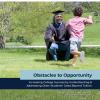Major Changes Are Coming to the FAFSA Process
The FAFSA Simplification Act and the Fostering Undergraduate Talent by Unlocking Resources for Education Act (FUTURE Act) will jointly guide the first sweeping redesign of the Free Application for Federal Student Aid (FAFSA®) system in over 40 years.
The updated process will provide:
•a more streamlined application process,
•expanded eligibility for federal student aid,
•reduced barriers for certain student populations, and
•a better user experience.
FAFSA simplification will be implemented in phases, with full implementation of major provisions in the 2024–25 award year.
Resources:

